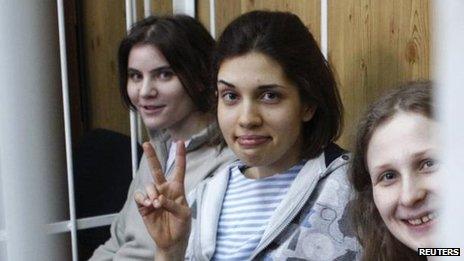Pussy Riot trial: Muscovites reflect on divisive case
- Published

Yekaterina Samutsevich, Nadia Tolokonnikova and Maria Alyokhina face up to seven years in prison
In St Nicholas' church in a historic district of Moscow, a Russian Orthodox priest wafts incense over icons, marking the start of his service.
It has a sort of mesmeric quality. Outside, recent rainfall freshens the air, and many in the congregation are happy to engage in conversation on the case of the Pussy Riot three.
Their controversial trial will begin on Monday. Having already spent the past five months in prison, for briefly singing a political protest song in Moscow's main cathedral, they now face up to seven years in jail.
It is a case that has divided Russia between those who think the women have been treated far too harshly, and those who feel their action grossly offended the Orthodox faith.
'It was blasphemy'
The women are accused of being among a group who danced in brightly-coloured balaclavas near the altar of the Cathedral of Christ the Saviour while calling on the Virgin Mary to rid Russia of Vladimir Putin.
"It was blasphemy. And they need to go to prison," one serious-looking young woman from the St Nicholas' congregation said.
A middle-aged man added: "You wouldn't insult your parents, and in the same way you wouldn't defecate in a church."
He was referring to the strong language Pussy Riot used in their song, and the fact that they danced so close to the altar.
But a young man in army uniform took a different view. "Our Lord said 'Judge not that you be not judged'. I don't think they should be in prison."
The official Russian Orthodox Church view is decidedly harsher, as spokesman Archpriest Vsevolod Chaplin outlines.
"For Orthodox Christians their holy places, holy objects and holy names are the most precious things in the world," he said. "You know very well how explosive were the acts of burning the Koran. And I am deeply concerned about the future of any society in which extremely divisive actions are ignored."
Political trial?
But this case has political overtones.
Pussy Riot staged their cathedral stunt as a protest at Patriarch Kirill's open support for Vladimir Putin in the build-up to the March Presidential election.
The Russian Orthodox church has always walked a moral tightrope throughout its long history, and has been criticized for its involvement with successive leaders from the Tsars to Stalin, and now, Vladimir Putin.
Pyotr Verzilov - himself a radical artist from the Moscow faction of the Voina group - is the husband of Nadia Tolokonnikova, one of the three members of Pussy Riot behind bars.
He claims that the course the church, police, prosecutors and courts have taken has been strongly influenced by the Kremlin.
"It's personally Putin and his closest assistants basically leading this case," he said.
"And it shows that on the twelfth year of controlling Russia, Putin is starting to lose the boundaries. He no more understands the limits of what he can do and what he cannot do."
At successive court hearings the judge has turned down the three women's repeated requests to be given bail while they waited for the trial.
Two of them have young children. Nadia Tolokonnikova's daughter Gera is just four years old.
Broken butterflies
Their treatment has caused deep disquiet among many Russians, who feel the women are - to take a phrase from the 1967 trial of members of the Rolling Stones - butterflies being broken on a wheel.
Among the intellectuals who signed a letter calling for their release were some surprises. For example Sergei Shargunov is a novelist with close links to the church.
Pyotr Verzilov, husband of Nadia Tolokonnikova says the trial is politically motivated
"I will be very sad if I know that the church asked somebody to take them and put them there," he said. "There are a lot of people in the church who say that prison is not the place for these girls."
Pussy Riot's fate has gained international attention. Superstar musicians like Sting, the Red Hot Chilli Peppers and Franz Ferdinand have supported their cause during visits to Moscow this summer.
But that will not help them in this trial. The three imprisoned women's supporters believe pressure from the Kremlin will be far more influential.
- Published20 July 2012
- Published20 June 2012
- Published4 May 2012